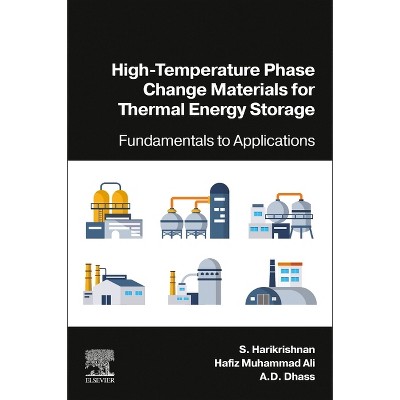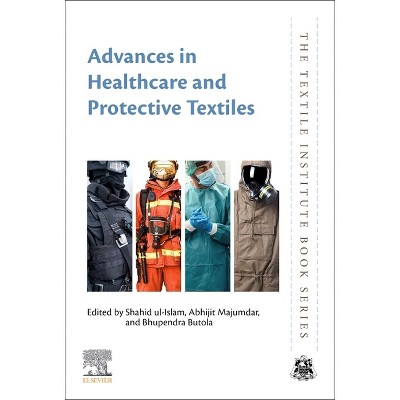Hybrid Materials for Piezoelectric Energy Harvesting and Conversion - by S Wazed Ali & Satyaranjan Bairagi & Shahid Ul Islam (Hardcover)

About this item
Highlights
- Hybrid Materials for Piezoelectric Energy Harvesting and Conversion Power small devices more efficiently and practically with these essential materials Piezoelectric energy harvesting is an increasingly widely-deployed technique to generate electricity from mechanical energy.
- About the Author: S. Wazed Ali, PhD, is an Associate Professor in the Department of Textile and Fibre Engineering at Indian Institute of Technology (IIT) Delhi, India.
- 352 Pages
- Science, Energy
Description
About the Book
"Piezoelectric energy harvesting is the most popular technique for generating electricity from vibrations to power small electronic devices. Batteries, the main source of power, have drawbacks in terms of limited life span and the difficulty of using it in remote places. The goal is to eliminate the need for periodic battery replacement or external power sources in situations where this would otherwise be difficult or impossible to provide, such as remote wireless sensors used in hazardous environments or for structural health monitoring applications. Piezoelectric energy harvesting devices could be a good alternative to batteries because of its reliability, easy processability, and cleanliness. Selecting piezoelectric materials is however a challenging task; there are different types of piezoelectric materials, such as natural crystal (quartz, Rochelle salt, and many more), ceramic, polymer, and hybrid piezoelectric materials. It is also well known that individual piezoelectric materials have different advantages but at the same time have various inherent limitations. Hence, the development of hybrid piezoelectric materials could be the better option as compared to individual piezoelectric materials. In hybrid piezoelectric materials, all the properties of the individual piezoelectric materials are compensated."--Book Synopsis
Hybrid Materials for Piezoelectric Energy Harvesting and ConversionPower small devices more efficiently and practically with these essential materials
Piezoelectric energy harvesting is an increasingly widely-deployed technique to generate electricity from mechanical energy. Reliability, ease of use, and cleanliness make piezoelectric energy harvesting in small electronic devices a potentially valuable alternative to the practical challenges and waste production of disposable or even reusable batteries. However, piezoelectric materials have their own challenges, advantages, and limitations, and choosing between them is a difficult engineering problem in itself; hybrid piezoelectric materials, which can be used to compensate the weaknesses of individual piezoelectric materials (like ceramic or polymer), are the emerging solution.
Hybrid Materials for Piezoelectric Energy Harvesting and Conversion offers a systematic analysis of these hybrid piezoelectric materials and their applications. Each hybrid piezoelectric material is analyzed for its fundamentals, structural requirements, and applications, and the result is a significant contribution to materials science and electronic engineering.
Hybrid Materials for Piezoelectric Energy Harvesting and Conversion readers will also find:
- Comprehensive coverage of piezoelectric materials to provide the best fit for any set of engineering needs
- Detailed discussion of inorganic, organic, and hybrid piezoelectric materials
- Surface modification of piezoelectric filler in composite based piezoelectric materials
- Importance of semiconductive and conductive materials in enhancing piezoelectric response of hybrid piezoelectric materials
- In depth analysis of bio-based hybrid piezoelectric materials
Hybrid Materials for Piezoelectric Energy Harvesting and Conversion is ideal for researchers in materials sciences, polymers, textiles, green and renewable energy, and all related fields.
From the Back Cover
Power small devices more efficiently and practically with these essential materials
Piezoelectric energy harvesting is an increasingly widely-deployed technique to generate electricity from mechanical energy. Reliability, ease of use, and cleanliness make piezoelectric energy harvesting in small electronic devices a potentially valuable alternative to the practical challenges and waste production of disposable or even reusable batteries. However, piezoelectric materials have their own challenges, advantages, and limitations, and choosing between them is a difficult engineering problem in itself; hybrid piezoelectric materials, which can be used to compensate the weaknesses of individual piezoelectric materials (like ceramic or polymer), are the emerging solution.
Hybrid Materials for Piezoelectric Energy Harvesting and Conversion offers a systematic analysis of these hybrid piezoelectric materials and their applications. Each hybrid piezoelectric material is analyzed for its fundamentals, structural requirements, and applications, and the result is a significant contribution to materials science and electronic engineering.
Hybrid Materials for Piezoelectric Energy Harvesting and Conversion readers will also find:
- Comprehensive coverage of piezoelectric materials to provide the best fit for any set of engineering needs
- Detailed discussion of inorganic, organic, and hybrid piezoelectric materials
- Surface modification of piezoelectric filler in composite based piezoelectric materials
- Importance of semiconductive and conductive materials in enhancing piezoelectric response of hybrid piezoelectric materials
- In depth analysis of bio-based hybrid piezoelectric materials
Hybrid Materials for Piezoelectric Energy Harvesting and Conversion is ideal for researchers in materials sciences, polymers, textiles, green and renewable energy, and all related fields.
About the Author
S. Wazed Ali, PhD, is an Associate Professor in the Department of Textile and Fibre Engineering at Indian Institute of Technology (IIT) Delhi, India. He has previously worked as a research scientist at multiple firms, and has published widely on piezoelectric energy harvesting devices and related subjects.
Satyaranjan Bairagi, PhD, is a Research Associate at the University of Glasgow, UK. He has published extensively on nanotechnology-based piezoelectric and triboelectric materials for nanogenerators and other related topics.
Shahid Ul Islam, PhD, is an Assistant Professor in the Department of Applied Sciences and Humanities at Jamia Millia Islamia (A Central University), New Delhi, India. He has previously been a Fulbright Postdoctoral Fellow at the University of California, Davis, United States, and is a life member of the Asian Polymer Association.
Shipping details
Return details
Trending Non-Fiction











